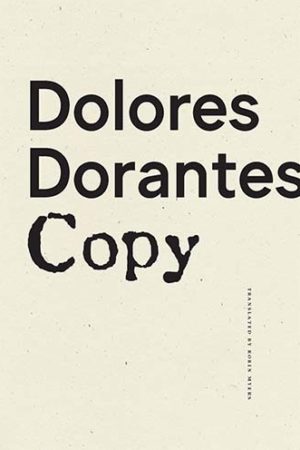Copy
by Dolores Dorantes, translated by Robin Myers
reviewed by heather hughes
“Say you’re displacement. Pilgrimage. [ … ] Say you’re a stone. Let’s finish the interrogation.” In Copy, the latest English volume by Mexican poet Dolores Dorantes, the violence and the possible outcomes of displacement are interrogated through a series of fragmentary prose poems. A journalist and acharya in the Buddhist tradition, Dorantes was raised in Ciudad Juárez but has lived in the United States since receiving political asylum in 2011.
The Real Academia Española’s online Diccionario de la lengua española gives the first definitions for copia as 1) the act of copying; 2) an abundance of something; 3) a literal reproduction of a text. The link between reproduction and abundance is opaque in the English word copy, despite both coming from the same Latin root word. This is worth noting explicitly because Dorantes integrates and interweaves the notions of copying/reproduction and abundance into the prose poems that make up Copy. These poems repeat, double back, and lean heavily into anaphora. A longer excerpt showcases how these techniques layer and shift meaning, as with the anaphora of “to lose” and repetition of “to reassemble oneself” here (the bold is Dorantes’s):
To lose territory. To lose blood. To lose resources. To lose environments. To lose form. To lose one’s way. To lose meaning. To lose one’s mind. To lose respect. To lose government. Copiously. To reassemble oneself. In curiosity. In heat. In structure. In the blood of a person or animal. To lose oneself. To lose all of oneself. All of you, not me. Copiously. You, not me. Abundantly. From a skin of ash. From an ocean of snow. From your shadow’s radioactivity. From the territory of burgeoning. To reassemble oneself. With a cutting edge. With ice. With a surgical blow. With hunger.
The book is divided into sections, each of which begin with stark black pages that include a close-up photograph of Spanish dictionary entries accompanied by an epigraph. The dictionary pages invite a closer interrogation of how language builds meaning, of how words are understood, and of how they relate to one another. Indeed, these pages expose how often the definitions of words are repetitive, circuitous, and reliant on the reproduction of other meanings to create sense. In both her longer essayistic prose poems and short single paragraph poems—the latter adrift in the white space of the page—Dorantes’s short sentences not only repeat language from the dictionary entries and epigraphs, but also reproduce the staccato bluntness and terseness of their form. “Criminally: committing injustices disguised as legality. The emptiness gives the appearance of feeling. Criminally. [ … ] It internalizes its power. It violates. Openly. It hates love.”
Copy interrogates, among many things, the complexities of identity: “To destroy oneself. To reassemble oneself. Constantly.” Throughout the book, Dorantes explores the tensions that exist between collective good and structural power, and between production and destruction, at both the personal and communal levels.
Meanings in Copy can change abruptly, and a copy of a sentence can highlight and deepen the reader’s understanding of the many displacements at work here. Halfway through the book, Dorantes writes, “Say you’re a stone. Materially. The decomposition of light illuminated you facedown.” This line reproduces an earlier assertion while also adding a stark visual, thereby extending the identification of self with stone. Additionally, “facedown” serves to invoke a violence. She then further complicates the materiality of the object, of personhood and subjectivity: “This you is me. A tragic destiny in front of the watchtower. Say the army boots dragged you here. Commonly, the good. This you is me. The volume of water and its shadow.” Through copying and repetition, a scene emerges: an army interrogation, the inseparability of you and me—and any individual’s inseparability from the military/state—illuminated through violence committed in the name of the common good.
One of many ways to situate Copy is within the tradition of Latin American activist-poets (such as Chilean poet Raúl Zurita) who write from and/or about exile, disappearance, and displacement. While both Zurita and Dorantes push at the boundaries of form and language to engage with these historical entanglements, Dorantes grounds this work not in the mythic or sacred, but rather in sociological and philosophical discourse: “the spectacle of consciousness.” Copy leaves blanks for the reader to fill throughout, including some actual ones: “Classify this behavior: .” The poems suggest that no utterance, no reading, can be the final one—that there is an abundance of future reproductions to interrogate.
Published on December 20, 2022

